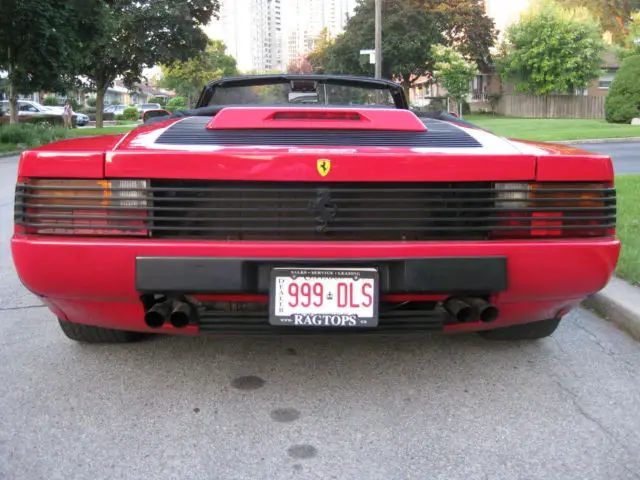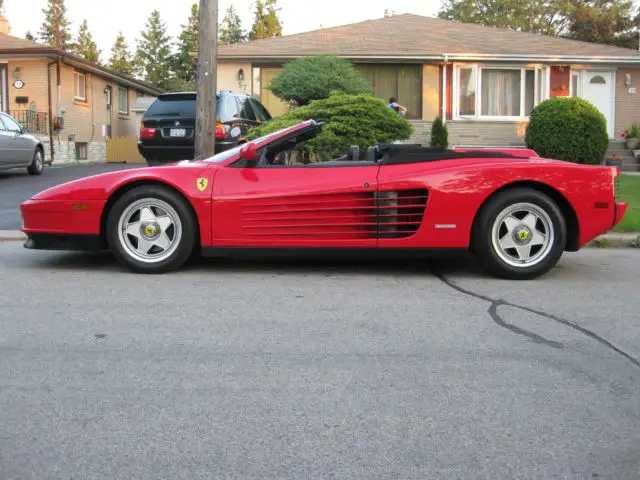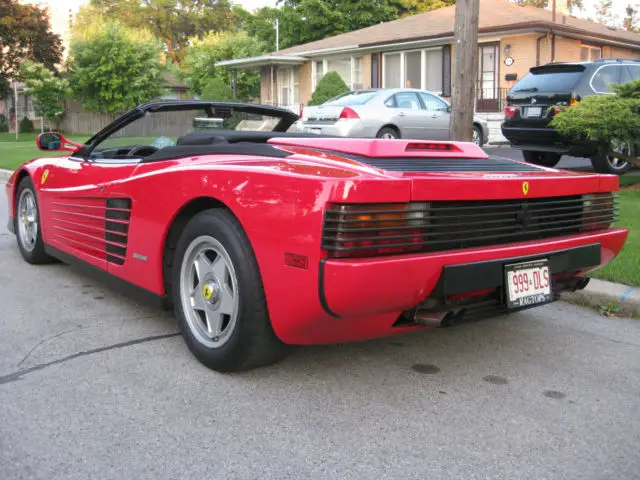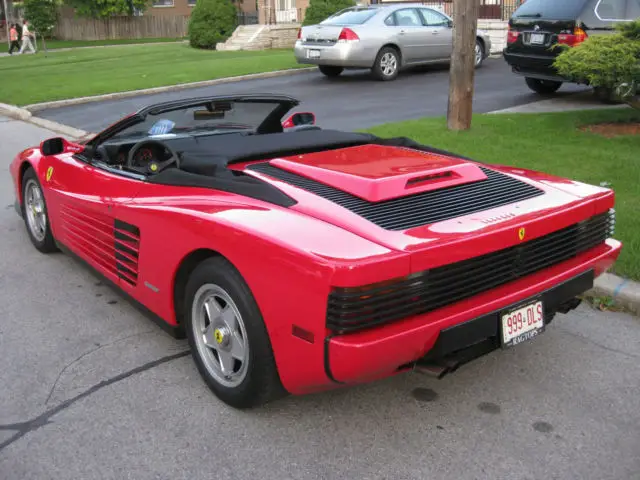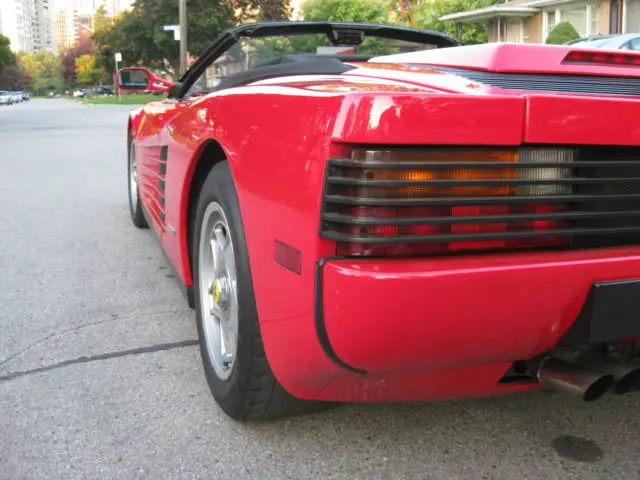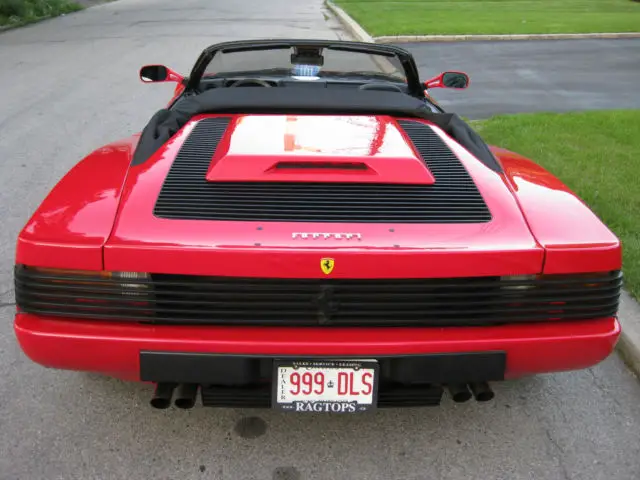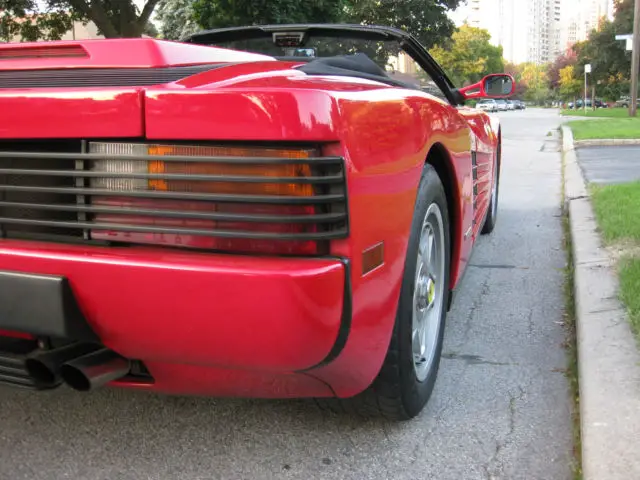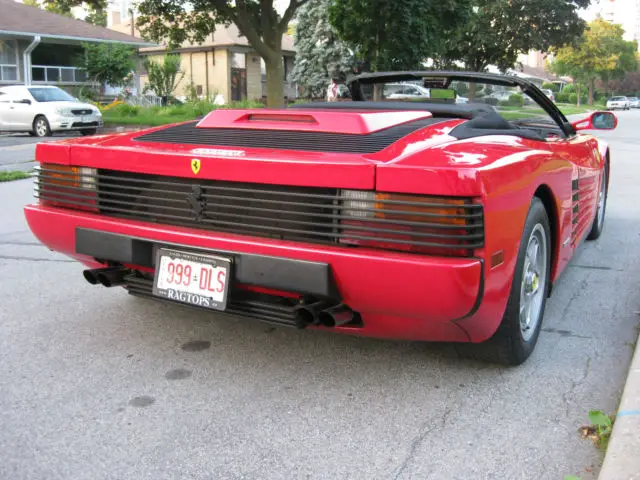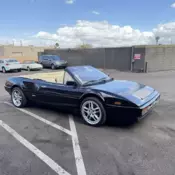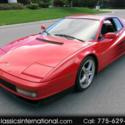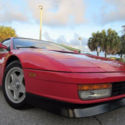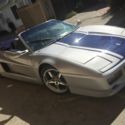1988 Ferrari Testarossa Spider Convertible Cabriolet
| Make: | Ferrari |
| Model: | Testarossa |
| Type: | Convertible |
| Trim: | Convertible Spider Cabriolet |
| Year: | 1988 |
| Mileage: | 34,000 |
| VIN: | ZFFSG17A5J0075448 |
| Color: | Red |
| Engine: | 12 Cylinder |
| Cylinders: | 12 Cylinder |
| Transmission: | Manual |
| Drive type: | Mid-engine |
| Interior color: | Black |
| Vehicle Title: | Clear |
| Item location: | North York, Ontario, Canada |
1988 Ferrari Testarossa Additional Info:
This gorgeous CBL Ferrari Testarossa Spyder is one of only two powertop convertibles in the world making it the ultimate in rare exotics. CBL conversions were the most innovatively engineered and most expensive conversions ever performed on the Testarossa. Other companies used inferior manual tops and vinyl rear windows. The car is equipped with factory original single-spline knockoff alloy wheels and a power convertible top/targa with glass rear window. The 4.9L, 12-cylinder engine puts out 390 HP and plenty of torque. The car has been well-maintained and has already had its out-of-car major engine and tranny service completed. This car was the world's fastest production car in 1988 at 181 mph (290 km/h). Going through the gears in this car is truly music to the ears and a real pleasure to drive. This is a very rare opportunity to own a highly-desirable legend. Please ask any questions prior to bidding. This is a U.S. Spec. Ferrari, sold new in the U.S.Ragtops Motorcar Company.We ship world wide.
Below is an article from the "Robb Report" It writes about the company who performed the highly engineered conversion.
Dream Cars – Robb Report For The Affluent Lifestyle
Reprinted from an Article dated May 1992
Dream Cars
A convertible conversion can turn
your hardtop production automobile into
a one-of-a-kind, hand-tailored machine.
By Chis Caswell
The paintwork is flawless on the brand-new BMW 850i, and the bodywork is voluptuously curved. The man stands for a moment, thoughtfully considering the gleaming roofline where it joins the body in a tiny galaxy of reflected pinpoints of light.
His hesitation lasts only a moment, though, and he reaches down quickly to pick up the tool. At a click, noise fills the cavernous warehouse with a howl that intensifies into a shriek as the steel-toothed saw, whirling at high speed bites into German metal. The mirrored finish shatters into tiny pieces, and the smell of hot steel drifts away as the saw bites deeper and deeper. With a final push, the smoking saw severs the roof from the body of the car.
Vandals? Car thieves? An exotic chop shop? No-just another Bimmer passing through the Coach Builders Limited facility in High Springs, Fla. CBL is one of several coachworks around the world that have made a business and a reputation by delivering what Detroit, Modena, Coventry, and Japan refuse to provide.
For whatever reason, BMW chose not to offer the 850i as a convertible–a decision that didn’t sit well with many BMW enthusiasts who wanted to feel the wind on their faces. If you’re one of them, simply deliver your new BMW 850i to CBL’s sales manager Larry Moran, leave a check for $18,500 on the seat, and return in a few weeks. You’ll find your BMW a flawless convertible with a power-operated top and a new profile guaranteed to stop traffic and turn heads.
If you don’t want that BMW, CBL will gladly behead any of a wide range of modern automobiles, ranging from a Mercedes-Benz 300CE to a Dodge Stealth to a Cadillac Eldorado. In fact, the company’s conversions are so popular that many new car dealers have the company provide them with convertibles for sale in showrooms.
CBL’s conversions are designed and engineered by Don McCullen, the company’s president. McCullen could easily have been spotted as a future coachbuilder in his youth, when he raced quarter-midgets and tinkered with an endless stream of cars. After college and a couple of successful business ventures, he did some car restorations, but it was a modern car that led to his new venture.
When Cadillac announced that it would no longer build Eldorado convertibles after 1976, McCullen saw a niche market for convertible conversions. “I looked at Cadillac’s 1976 production figures of 14,000 convertibles, and I knew that demand wouldn’t dry up overnight,” he explains. “Maybe there wasn’t enough business to interest GM, but a small operation could probably turn a profit.”
McCullen started with a single Coupe de Ville conversion, which he exhibited at the 1977 New York Auto Show. The car caught on, and he’s never looked back. With a natural eye for the “right” lines of a convertible, McCullen has expanded his operation to include conversions of such exotics as the Jaguar XJS (which helped convince Jaguar to introduce their own convertible), the Mercedes 560SEC, the Ferrari Testarossa, the Cadillac Brougham four-door, and the Lincoln Mark VII.
As soon as a new car is introduced, McCullen visualizes it as a convertible. “A car has to look good as a convertible, and there are many that won’t,” he says. He also looks at the potential market for such a conversion, because he can easily invest more than $200,000 in the preliminary engineering for such a project, and that has to be recouped over a number of conversions.
The newest project for McCullen and CBL is the Dodge Stealth/Mitsubishi 3000 (they are the same car), which is one of the most talked-about performance cars in recent years. With a long nose, a steeply raked windshield, and a fender line that holds the car together visually, this sporty roadster is very popular. Best of all, CBL retains the vehicle’s four-seater capacity, which means that the Stealth/3000 can be used as a family sports car.
A more remarkable project for CBL is a conversion of the Ferrari Testarossa. McCullen came up with a cleverly designed convertible/targa top that is a masterpiece of engineering. For $35,000, a Testarossa owner gets a targa-topped car with a hatch over the cockpit that can be removed and stored easily under the hood. This leaves the occupants protected from the wind, since a solid glass vertical rear window remains under the targa top, but at the push of a button, the window retracts and the targa structure drops straight down, leaving a sleek convertible.
If you prefer German cars, you can commission CBL to turn your Mercedes-Benz 300CE or 560SEC into a convertible, for $16,500 or $18,500 respectively. Prices for the Cadillac conversions range from $14,900 for the Eldo or de Ville to $29,500 for the Brougham. The Lincoln Mark VIII and Stealth/3000 conversions are each priced at $14,900.
There are several good reasons for going topless, even in an age when sunroofs abound. First, there is a particular pleasure in the caress of sun and wind on your face. People who enjoy the outdoors, from golfers to yachtsmen, are good prospects for convertibles. A custom convertible is also an attention-getter on any street, and it’s a unique statement of your enthusiasm for automobiles. In addition, a conversion often creates a more practical convertible than most manufacturers offer. A Cadillac Allante, for example, is available only as a two-seat convertible, while a customized Eldorado can carry the whole family.
What’s involved in a conversion? The starting point, of course, is either a privately owned car or a new car direct from the factory. The roof is cut off, the rear hatch is unbolted, and the interior is gutted, with most of it set aside for reinstallation later. A curved bulkhead is welded in behind the cockpit to close off the trunk area as well as to create a well in which the folded top is stored. In addition, this bulkhead ties the shell of the car together and strengthens the area around the suspension points.
A good conversion company takes great pains to reinforce the vehicle’s structure to eliminate any flexibility caused when the roof is removed. After all, the roof ties the front of the car to the rear while creating a box structure that absorbs engine torque and suspension twist. Alone, the floorpan under the cockpit is usually not enough to support the structure. With high-performance cars, any flexibility in the chassis can be not only unnerving, but dangerous. Of course, before proceeding with a conversion, car owners should check with an expert to make sure their vehicles have a structural rigidity at least equal to that of the coupe.
It’s easy simply to weld in enough steel to make the frame rigid, but weight is the downside. Good conversion companies are highly selective about reinforcing only areas that need strength, which keeps the weight the same as the original coupe. Usually, to strengthen the fore-and-aft rigidity, a structural tube rail is added inside the rocker panels under the cockpit. With the car jacked up, the rail is welded into place with a slight arch. This prestresses the section. The result is both light and strong.
At this point, the interior is reinstalled along with new trim pieces to match the old, and the car is ready for an afternoon drive. In general, a conversion takes anywhere from three to eight weeks from start to completion.
With the experience of 15 years of conversions, CBL’s Moran has some specific advice for anyone considering a conversion. “There are three aspects that all have to be right to have a good conversion,” he explains. “First, the entire convertible mechanism has to work efficiently. If you don’t get the geometry for the bows and pivot points exactly right, even the best hydraulics won’t be able to put the top up smoothly.
“Second, the top has to fold down into a very small area, so it doesn’t encroach on the interior room of the car. If the car is designed as a four seater, it should remain that way. As a result, we are very careful to preserve all the cockpit room found in the original hardtop.
“Third, the top has to look good when it’s up. It’s easy for most convertibles to look good with the top down, but the real criterion is how the car looks with the top in place.”
In addition, prospective buyers should check the fit and finish of the conversion. “The windows should fit tightly into the top and not only seal out water, but keep wind noise to an absolute minimum.
Adds CBL’s Moran, “Our tops not only have an inner liner, but they are padded and insulated. Your convertible will never be as quiet as a coupe, of course, because your top is fabric. But we’ve found that, for example, our Eldorado conversions are considerably quieter than the factory convertibles. Another area to check is the weather stripping around the windows, to keep out wind whistle as well as water.”
In addition, a prospective buyer should check the convertible top to see if it is rigid or flexible when it is erected. Obviously, since it is fabric, it will have a little give, but the entire structure should be solid. Any flexibility to the bows and support system is an indication that the top is poorly designed or built.
A well-engineered top should also be easy to use. The latch mechanism to attach the top to the windshield frame must be easy enough for women to operate, yet strong enough for years of service.
Which brings us to another important point: the warranty. This is obviously a critical consideration, since you’ll probably keep the car for several years, and it should still work properly all that time. In cars that aren’t sufficiently reinforced, for example, doors may become difficult to open because the body has bent. The folding mechanism for the top can become balky if it is made too lightly, and even attaching the top to the windshield can become a struggle if everything doesn’t work properly. CBL warrants their conversions for one year or 12,000 miles to guarantee full satisfaction with the performance of the top.
One other point CBL’s Moran makes is that prospective buyers are often given misleading information regarding the effect of a conversion on the factory warranty; some owners believe, for example that a conversion will void the factory warranty. Moran has discussed this situation with Mercedes-Benz and confirms that a CBL conversion will not affect the original Mercedes-Benz warranty in any way.
Do the dollars invested in a conversion make sense? That all depends on your personal viewpoint. After all, a convertible isn’t a logical purchase, so your own pleasure has to be factored into the equation. However, according to Moran. “The resale value holds up well. We’ve found that our convertibles hold their value in proportion to that of the car.”
“When you enjoy the wind and the sun, you can erase a bad day or six months of bad weather. You see stuff and you smell stuff, and the day is more enjoyable. When you put the top down, it changes the character of the car, and its driver.”
